九年级英语unit10知识点
- 格式:doc
- 大小:59.00 KB
- 文档页数:6
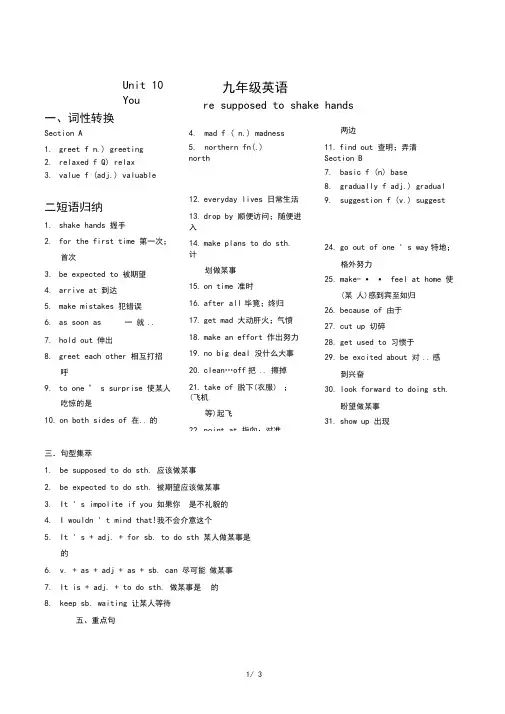
Unit 10 You一、词性转换Section A1. greet f n.) greeting2. relaxed f Q) relax3. value f (adj.) valuable二短语归纳1. shake hands 握手2. for the first time 第一次;首次3. be expected to 被期望4. arrive at 到达5. make mistakes 犯错误6. as soon as 一 就 ..7. hold out 伸出8. greet each other 相互打招呼9. to one ’ s surprise 使某人吃惊的是10. on both sides of 在 .. 的两边11. find out 查明;弄清 Section B7. basic f (n) base8. gradually f adj.) gradual9. suggestion f (v.) suggest24. go out of one ' s way 特地;格外努力25. make- • • feel at home 使(某 人)感到宾至如归26. because of 由于 27. cut up 切碎 28. get used to 习惯于 29. be excited about 对 .. 感到兴奋30. look forward to doing sth.盼望做某事31. show up 出现三.句型集萃1. be supposed to do sth. 应该做某事2. be expected to do sth. 被期望应该做某事3. It ' s impolite if you 如果你 是不礼貌的4. I wouldn ' t mind that!我不会介意这个5. It ' s + adj. + for sb. to do sth 某人做某事是的6. v. + as + adj + as + sb. can 尽可能 做某事7. It is + adj. + to do sth. 做某事是 的8. keep sb. waiting 让某人等待五、重点句九年级英语re supposed to shake hands4. mad f ( n.) madness5. northern fn(.) north12. everyday lives 日常生活 13. drop by 顺便访问; 随便进入14. make plans to do sth.计划做某事15. on time 准时 16. after all 毕竟;终归 17. get mad 大动肝火;气愤 18. make an effort 作出努力 19. no big deal 没什么大事 20. clean …off 把 .. 擦掉 21. take of 脱下(衣服) ;(飞机等)起飞22. point at 指向;对准1. That ’ s how people in Japan are expected to greet each other. 那是人们在日本彼此打招呼应该做的。
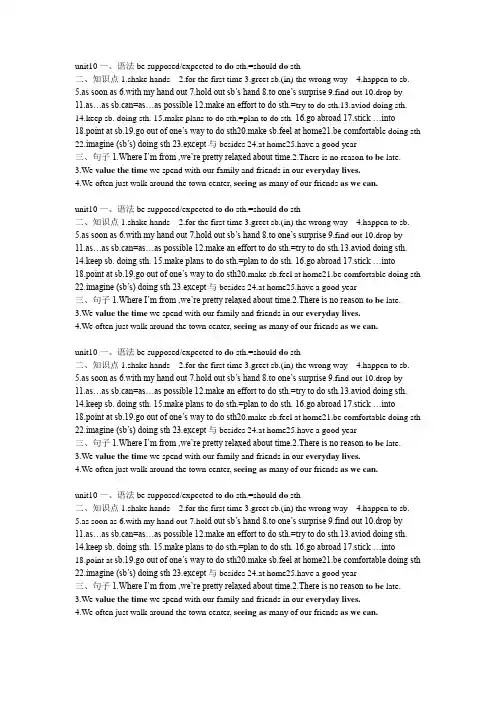
unit10一、语法be supposed/expected to do sth.=should do sth二、知识点1.shake hands 2.for the first time 3.greet sb.(in) the wrong way 4.happen to sb.5.as soon as6.with my hand out7.hold out sb’s hand8.to one’s surprise9.find out 10.drop by 11.as…as sb.can=as…as possible 12.make an effort to do sth.=try to do sth.13.aviod doing sth. 14.keep sb. doing sth. 15.make plans to do sth.=plan to do sth. 16.go abroad 17.stick …into18.point at sb.19.go out of one’s way to do sth20.make sb.feel at home21.be comfortabl e doing sth22.imagine (sb’s) doing sth 23.except与besides 24.at home25.have a good year三、句子1.Where I’m from ,we’re pretty relaxed about time.2.There is no reason to be late.3.We value the time we spend with our family and friends in our everyday lives.4.We often just walk around the town center, seeing as many of our friends as we can.unit10一、语法be supposed/expected to do sth.=should do sth二、知识点1.shake hands 2.for the first time 3.greet sb.(in) the wrong way 4.happen to sb.5.as soon as6.with my hand out7.hold out sb’s hand8.to one’s surprise9.find out 10.drop by 11.as…as sb.can=as…as possible 12.make an effort to do sth.=try to do sth.13.aviod doing sth. 14.keep sb. doing sth. 15.make plans to do sth.=plan to do sth. 16.go abroad 17.stick …into18.point at sb.19.go out of one’s way to do sth20.make sb.feel at home21.be comfortable doing sth22.imagine (sb’s) doing sth 23.except与besides 24.at home25.have a good year三、句子1.Where I’m from ,we’re pretty relaxed about time.2.There is no reason to be late.3.We value the time we spend with our family and friends in our everyday lives.4.We often just walk around the town center, seeing as many of our friends as we can.unit10一、语法be supposed/expected to do sth.=should do sth二、知识点1.shake hands 2.for the first time 3.greet sb.(in) the wrong way 4.happen to sb.5.as soon as6.with my hand out7.hold out sb’s hand8.to one’s surprise9.find out 10.drop by 11.as…as sb.can=as…as possible 12.make an effort to do sth.=try to do sth.13.aviod doing sth. 14.keep sb. doing sth. 15.make plans to do sth.=plan to do sth. 16.go abroad 17.stick …into18.point at sb.19.go out of one’s way to do sth20.make sb.feel at home21.be comfortable doing sth22.imagine (sb’s) doing sth 23.except与besides 24.at home25.have a good year三、句子1.Where I’m from ,we’re pretty relaxed about time.2.There is no reason to be late.3.We value the time we spend with our family and friends in our everyday lives.4.We often just walk around the town center, seeing as many of our friends as we can.unit10一、语法be supposed/expected to do sth.=should do sth二、知识点1.shake hands 2.for the first time 3.greet sb.(in) the wrong way 4.happen to sb.5.as soon as6.with my hand out7.hol d out sb’s hand8.to one’s surprise9.find out 10.drop by 11.as…as sb.can=as…as possible 12.make an effort to do sth.=try to do sth.13.aviod doing sth. 14.keep sb. doing sth. 15.make plans to do sth.=plan to do sth. 16.go abroad 17.stick …into18.point at sb.19.go out of one’s way to do sth20.make sb.feel at home21.be comfortable doing sth22.imagine (sb’s) doing sth 23.except与besides 24.at home25.have a good year三、句子1.Where I’m from ,we’re pretty relaxed about time.2.There is no reason to be late.3.We value the time we spend with our family and friends in our everyday lives.4.We often just walk around the town center, seeing as many of our friends as we can.unit10一、语法:应该干某事二、知识点1.握手2.第一次3.用错误的方式问候某人 4.发生在某人身上5.一…就6伸着我的手7.伸出某人的手8.令某人惊奇的是9.发现(经努力).10顺便拜访11.尽可能12.努力干某事13.避免干某事14.一直干某事15.计划干某事16.出国17.将…刺入18.指着某人.19.特地干某事20.使某人感到宾至如归1.自如的干某事22.想象(某人)干某事23.除…之外无/除…之外还有24.在家里/在国内25.一个学年过得愉快三、句子1.我来的地方,我们对于时间是相当宽松的.2.没理由迟到3.我们重视在我们的日常生活中和我们的家人和朋友一起度过的时光4.我们恰恰绕着市中心散步,会见我们尽可能多的朋友.unit10一、语法:应该干某事二、知识点1.握手2.第一次3.用错误的方式问候某人 4.发生在某人身上5.一…就6伸着我的手7.伸出某人的手8.令某人惊奇的是9.发现(经努力).10顺便拜访11.尽可能12.努力干某事13.避免干某事14.一直干某事15.计划干某事16.出国17.将…刺入18.指着某人.19.特地干某事20.使某人感到宾至如归1.自如的干某事22.想象(某人)干某事23.除…之外无/除…之外还有24.在家里/在国内25.一个学年过得愉快三、句子1.我来的地方,我们对于时间是相当宽松的.2.没理由迟到3.我们重视在我们的日常生活中和我们的家人和朋友一起度过的时光4.我们恰恰绕着市中心散步,会见我们尽可能多的朋友.unit10一、语法:应该干某事二、知识点1.握手2.第一次3.用错误的方式问候某人 4.发生在某人身上5.一…就6伸着我的手7.伸出某人的手8.令某人惊奇的是9.发现(经努力).10顺便拜访11.尽可能12.努力干某事13.避免干某事14.一直干某事15.计划干某事16.出国17.将…刺入18.指着某人.19.特地干某事20.使某人感到宾至如归1.自如的干某事22.想象(某人)干某事23.除…之外无/除…之外还有24.在家里/在国内25.一个学年过得愉快三、句子1.我来的地方,我们对于时间是相当宽松的.2.没理由迟到3.我们重视在我们的日常生活中和我们的家人和朋友一起度过的时光4.我们恰恰绕着市中心散步,会见我们尽可能多的朋友.unit10一、语法:应该干某事二、知识点1.握手2.第一次3.用错误的方式问候某人 4.发生在某人身上5.一…就6伸着我的手7.伸出某人的手8.令某人惊奇的是9.发现(经努力).10顺便拜访11.尽可能12.努力干某事13.避免干某事14.一直干某事15.计划干某事16.出国17.将…刺入18.指着某人.19.特地干某事20.使某人感到宾至如归1.自如的干某事22.想象(某人)干某事23.除…之外无/除…之外还有24.在家里/在国内25.一个学年过得愉快三、句子1.我来的地方,我们对于时间是相当宽松的.2.没理由迟到3.我们重视在我们的日常生活中和我们的家人和朋友一起度过的时光4.我们恰恰绕着市中心散步,会见我们尽可能多的朋友.。
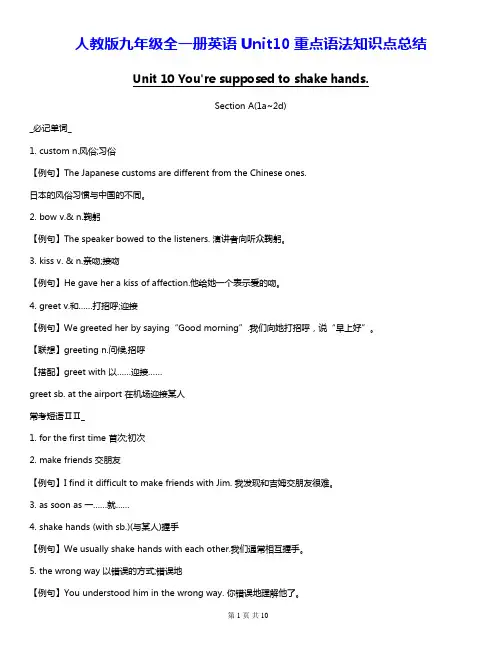
人教版九年级全一册英语Unit10重点语法知识点总结Unit 10 You're supposed to shake hands.Section A(1a~2d)_必记单词_1. custom n.风俗;习俗【例句】The Japanese customs are different from the Chinese ones.日本的风俗习惯与中国的不同。
2. bow v.& n.鞠躬【例句】The speaker bowed to the listeners. 演讲者向听众鞠躬。
3. kiss v. & n.亲吻;接吻【例句】He gave her a kiss of affection.他给她一个表示爱的吻。
4. greet v.和……打招呼;迎接【例句】We greeted her by saying“Good morning”.我们向她打招呼,说“早上好”。
【联想】greeting n.问候,招呼【搭配】greet with 以……迎接……greet sb. at the airport 在机场迎接某人常考短语ⅡⅡ_1. for the first time 首次;初次2. make friends 交朋友【例句】I find it difficult to make friends with Jim. 我发现和吉姆交朋友很难。
3. as soon as 一……就……4. shake hands (with sb.)(与某人)握手【例句】We usually shake hands with each other.我们通常相互握手。
5. the wrong way 以错误的方式;错误地【例句】You understood him in the wrong way. 你错误地理解他了。
6. hold out 伸出(手等)7. greet each other 互相问候8. to one’s surprise 令某人惊讶的是经典句型ⅢⅡ1. That's how people in Japan are expected to greet each other.那就是在日本人们互相问候的方式。
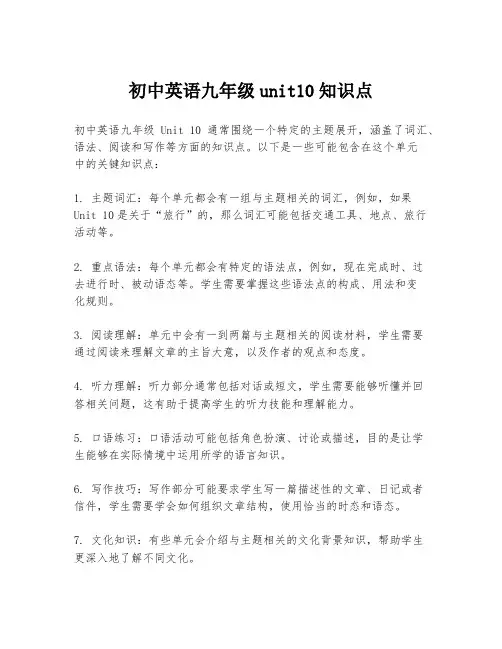
初中英语九年级unit10知识点初中英语九年级Unit 10通常围绕一个特定的主题展开,涵盖了词汇、语法、阅读和写作等方面的知识点。
以下是一些可能包含在这个单元中的关键知识点:1. 主题词汇:每个单元都会有一组与主题相关的词汇,例如,如果Unit 10是关于“旅行”的,那么词汇可能包括交通工具、地点、旅行活动等。
2. 重点语法:每个单元都会有特定的语法点,例如,现在完成时、过去进行时、被动语态等。
学生需要掌握这些语法点的构成、用法和变化规则。
3. 阅读理解:单元中会有一到两篇与主题相关的阅读材料,学生需要通过阅读来理解文章的主旨大意,以及作者的观点和态度。
4. 听力理解:听力部分通常包括对话或短文,学生需要能够听懂并回答相关问题,这有助于提高学生的听力技能和理解能力。
5. 口语练习:口语活动可能包括角色扮演、讨论或描述,目的是让学生能够在实际情境中运用所学的语言知识。
6. 写作技巧:写作部分可能要求学生写一篇描述性的文章、日记或者信件,学生需要学会如何组织文章结构,使用恰当的时态和语态。
7. 文化知识:有些单元会介绍与主题相关的文化背景知识,帮助学生更深入地了解不同文化。
8. 语言功能:每个单元都会有一些语言功能,如提出请求、表达同意或不同意、表达喜好等,学生需要学会在适当的情境中使用这些功能。
9. 综合运用:单元的最后通常会有一个综合运用部分,要求学生将所学的语言知识应用到一个具体的任务或项目中。
请注意,具体的知识点会根据不同的教材和课程设置有所不同。
以上内容仅供参考,具体的教学内容应以实际使用的教材为准。
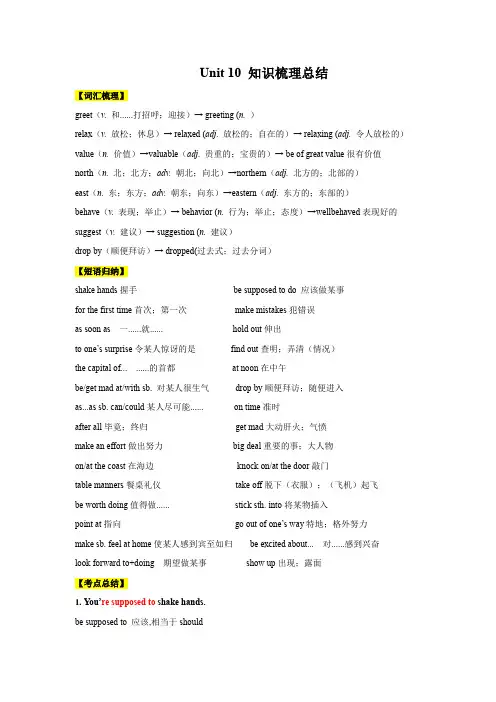
Unit 10 知识梳理总结【词汇梳理】greet(v.和......打招呼;迎接)→ greeting (n. )relax(v.放松;休息)→ relaxed (adj. 放松的;自在的)→ relaxing (adj. 令人放松的)value(n.价值)→valuable(adj.贵重的;宝贵的)→ be of great value很有价值north(n.北;北方;adv.朝北;向北)→northern(adj.北方的;北部的)east(n.东;东方;adv.朝东;向东)→eastern(adj.东方的;东部的)behave(v.表现;举止)→ behavior (n. 行为;举止;态度)→wellbehaved表现好的suggest(v.建议)→ suggestion (n. 建议)drop by(顺便拜访)→ dropped(过去式;过去分词)【短语归纳】shake hands握手be supposed to do 应该做某事for the first time首次;第一次make mistakes犯错误as soon as 一......就...... hold out伸出to one’s surprise令某人惊讶的是find out查明;弄清(情况)the capital of... ......的首都at noon在中午be/get mad at/with sb. 对某人很生气drop by顺便拜访;随便进入as...as sb. can/could某人尽可能...... on time准时after all毕竟;终归get mad大动肝火;气愤make an effort做出努力big deal重要的事;大人物on/at the coast在海边knock on/at the door敲门table manners餐桌礼仪take off脱下(衣服);(飞机)起飞be worth doing值得做...... stick sth. into将某物插入point at指向go out of one’s way特地;格外努力make sb. feel at home使某人感到宾至如归be excited about... 对......感到兴奋look forward to+doing 期望做某事show up出现;露面【考点总结】1.You’re supposed to shake hands.be supposed to 应该,相当于shoulde.g.We are supposed to help each other.=We should help each other.【注】suppose意为“认为;推断”时,其后常接宾语从句,在宾语从句中否定要前移。
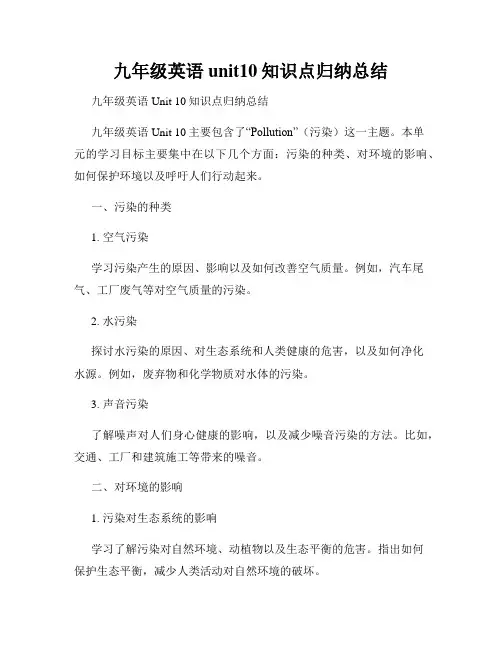
九年级英语unit10知识点归纳总结九年级英语Unit 10知识点归纳总结九年级英语Unit 10主要包含了“Pollution”(污染)这一主题。
本单元的学习目标主要集中在以下几个方面:污染的种类、对环境的影响、如何保护环境以及呼吁人们行动起来。
一、污染的种类1. 空气污染学习污染产生的原因、影响以及如何改善空气质量。
例如,汽车尾气、工厂废气等对空气质量的污染。
2. 水污染探讨水污染的原因、对生态系统和人类健康的危害,以及如何净化水源。
例如,废弃物和化学物质对水体的污染。
3. 声音污染了解噪声对人们身心健康的影响,以及减少噪音污染的方法。
比如,交通、工厂和建筑施工等带来的噪音。
二、对环境的影响1. 污染对生态系统的影响学习了解污染对自然环境、动植物以及生态平衡的危害。
指出如何保护生态平衡,减少人类活动对自然环境的破坏。
2. 污染对人类健康的影响探讨污染对人类健康的潜在风险,如呼吸系统疾病、水源感染等。
呼吁保护环境、减少对污染物的暴露,以改善人类的健康状况。
三、保护环境的方法1. 减少污染源介绍如何减少污染产生的源头,例如使用清洁能源、改善工业和农业生产过程等。
2. 回收利用强调废物的回收利用,减少对资源的浪费,并推广环保意识。
3. 提倡低碳生活鼓励人们采取低碳生活方式,如步行、骑自行车或使用公共交通工具,减少汽车尾气对空气的污染。
四、呼吁行动号召人们行动起来,通过个人的努力来保护环境。
我们每个人都应该采取行动,保护我们的地球家园。
五、总结本单元主要介绍了“Pollution(污染)”这一主题。
通过学习相关知识,我们深刻认识到污染的严重性以及对环境和人类健康的影响。
只有我们每个人都积极行动起来,减少污染、保护环境,才能创造一个更美好的未来。
总之,通过学习九年级英语Unit 10中的知识点,我们能够更好地了解污染的种类、对环境的影响,以及如何保护环境和呼吁人们行动起来。
希望大家能够认真对待这一问题,并为保护地球共同努力。
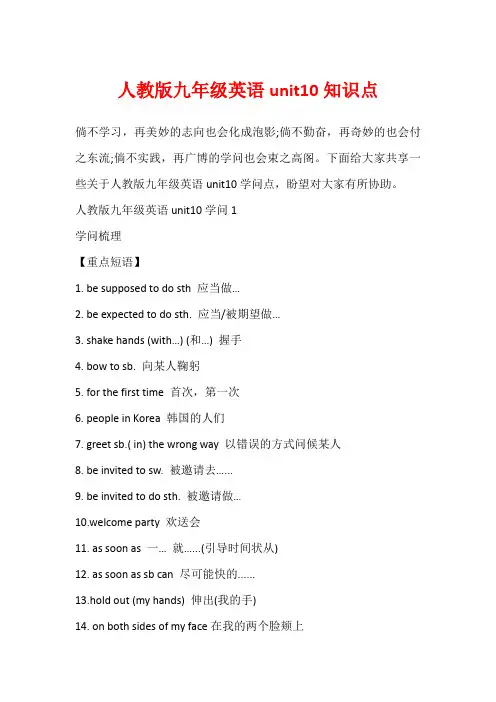
人教版九年级英语unit10知识点倘不学习,再美妙的志向也会化成泡影;倘不勤奋,再奇妙的也会付之东流;倘不实践,再广博的学问也会束之高阁。
下面给大家共享一些关于人教版九年级英语unit10学问点,盼望对大家有所协助。
人教版九年级英语unit10学问1学问梳理【重点短语】1. be supposed to do sth 应当做…2. be expected to do sth. 应当/被期望做…3. shake hands (with…) (和…) 握手4. bow to sb. 向某人鞠躬5. for the first time 首次,第一次6. people in Korea 韩国的人们7. greet sb.( in) the wrong way 以错误的方式问候某人8. be invited to sw. 被邀请去…...9. be invited to do sth. 被邀请做…10.welcome party 欢送会11. as soon as 一… 就…...(引导时间状从)12. as soon as sb can 尽可能快的......13.hold out (my hands) 伸出(我的手)14. on both sides of my face在我的两个脸颊上15. be from= come from 来自16. be relaxed about 对…放松/随意17. a bit/ little late 晚一点18. value the time we spend with sb珍惜我们与某人度过的时间19.in our everyday lives 在我们的日常生活中20. drop by 顺便探望,随意进入21. make plans ( to do sth.) 打算做某事22. plan to do sth.打算做某事23. on the side of the face在脸的一侧24. the town center 在城镇中心25. as many as sb can = as many as possible 尽可能多的…26. be on time 守时27. the capital of clocks and watches钟表之都28. after all 终归,终归29. at noon 在中午30. 15 minutes late 迟到15分钟【重点句型】1. He should have told me about it.他本应当把这件事告知我。
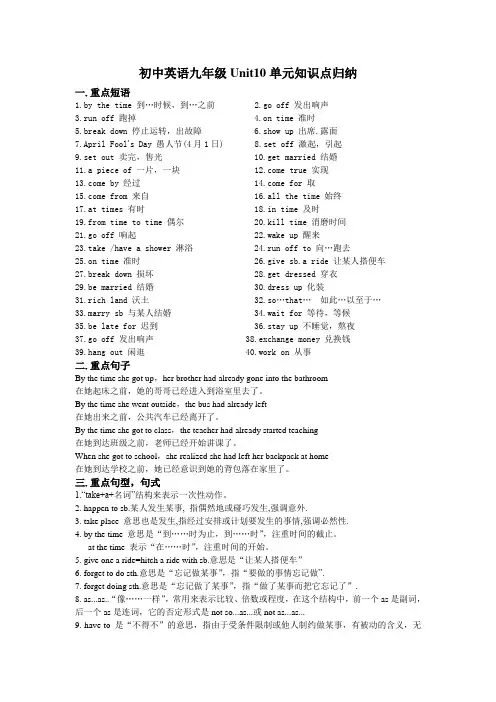
初中英语九年级Unit10单元知识点归纳一.重点短语1.by the time 到…时候,到…之前2.go off 发出响声3.run off 跑掉4.on time 准时5.break down 停止运转,出故障6.show up 出席.露面7.April Fool’s Day 愚人节(4月1日) 8.set off 激起,引起9.set out 卖完,售光 10.get married 结婚11.a piece of 一片,一块 e true 实现e by 经过 e for 取e from 来自 16.all the time 始终17.at times 有时 18.in time 及时19.from time to time 偶尔 20.kill time 消磨时间21.go off 响起 22.wake up 醒来23.take /have a shower 淋浴 24.run off to 向…跑去25.on time 准时 26.give sb.a ride 让某人搭便车27.break down 损坏 28.get dressed 穿衣29.be married 结婚 30.dress up 化装31.rich land 沃土 32.so…that…如此…以至于…33.marry sb 与某人结婚 34.wait for 等待,等候35.be late for 迟到 36.stay up 不睡觉,熬夜37.go off 发出响声 38.exchange money 兑换钱39.hang out 闲逛 40.work on 从事二.重点句子By the time she got up,her brother had already gone into the bathroom在她起床之前,她的哥哥已经进入到浴室里去了。
By the time she went outside,the bus had already left在她出来之前,公共汽车已经离开了。
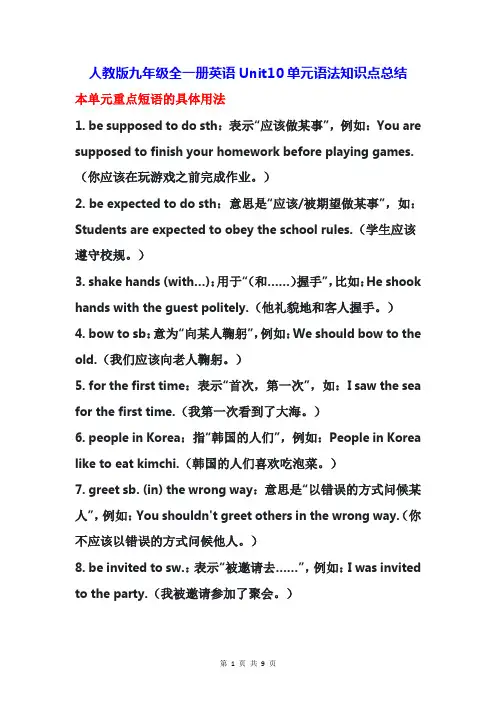
人教版九年级全一册英语Unit10单元语法知识点总结本单元重点短语的具体用法1. be supposed to do sth:表示“应该做某事”,例如:You are supposed to finish your homework before playing games.(你应该在玩游戏之前完成作业。
)2. be expected to do sth:意思是“应该/被期望做某事”,如:Students are expected to obey the school rules.(学生应该遵守校规。
)3. shake hands (with…):用于“(和……)握手”,比如:He shook hands with the guest politely.(他礼貌地和客人握手。
)4. bow to sb:意为“向某人鞠躬”,例如:We should bow to the old.(我们应该向老人鞠躬。
)5. for the first time:表示“首次,第一次”,如:I saw the sea for the first time.(我第一次看到了大海。
)6. people in Korea:指“韩国的人们”,例如:People in Korea like to eat kimchi.(韩国的人们喜欢吃泡菜。
)7. greet sb. (in) the wrong way:意思是“以错误的方式问候某人”,例如:You shouldn't greet others in the wrong way.(你不应该以错误的方式问候他人。
)8. be invited to sw.:表示“被邀请去……”,例如:I was invited to the party.(我被邀请参加了聚会。
)9. be invited to do sth.:意思是“被邀请做……”,如:She was invited to speak at the conference.(她被邀请在会议上发言。
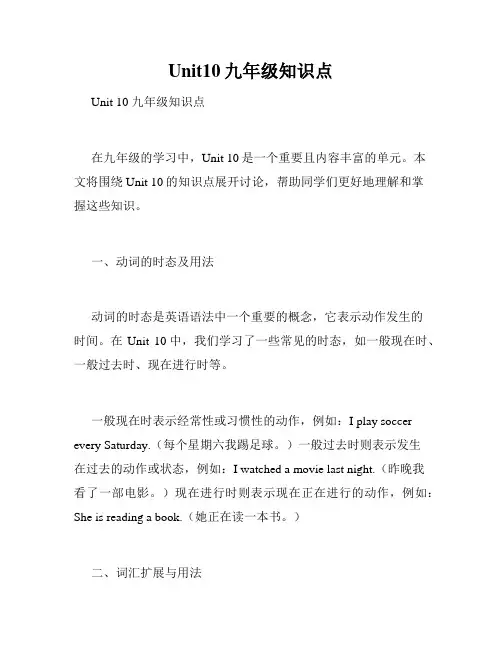
Unit10九年级知识点Unit 10 九年级知识点在九年级的学习中,Unit 10是一个重要且内容丰富的单元。
本文将围绕Unit 10的知识点展开讨论,帮助同学们更好地理解和掌握这些知识。
一、动词的时态及用法动词的时态是英语语法中一个重要的概念,它表示动作发生的时间。
在Unit 10中,我们学习了一些常见的时态,如一般现在时、一般过去时、现在进行时等。
一般现在时表示经常性或习惯性的动作,例如:I play soccer every Saturday.(每个星期六我踢足球。
)一般过去时则表示发生在过去的动作或状态,例如:I watched a movie last night.(昨晚我看了一部电影。
)现在进行时则表示现在正在进行的动作,例如:She is reading a book.(她正在读一本书。
)二、词汇扩展与用法扩充词汇量对于提高英语表达能力非常重要。
Unit 10中,我们学习了一些与旅行相关的词汇,如passport(护照)、destination (目的地)、tourist(游客)等。
掌握这些词汇不仅可以帮助我们更好地理解和阅读英语材料,还能够使我们在旅行中更加流利地交流。
此外,我们还学习了一些常用的短语和表达方式,如keep in touch(保持联系)、have a good time(玩得开心)等。
这些短语和表达方式可以在日常生活和交流中派上用场。
三、被动语态的构成及用法被动语态是英语中的一个重要句式,它用于强调动作的接受者而不是执行者。
在Unit 10中,我们学习了被动语态的构成及用法。
被动语态的构成通常由助动词be加上动词的过去分词形式而成,例如:The book was written by Mark Twain.(这本书是马克·吐温写的。
)被动语态常用于句子中缺少执行者的情况,或者强调动作的接受者的重要性。
四、连词的使用连词在英语中连接或者分割句子,使语言更加流畅。
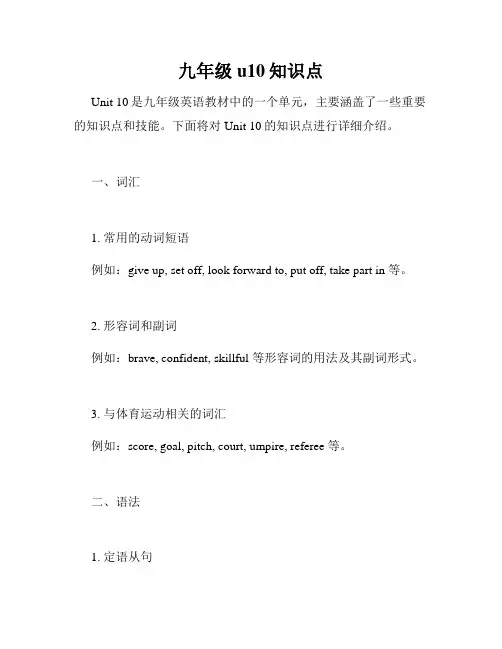
九年级u10知识点Unit 10是九年级英语教材中的一个单元,主要涵盖了一些重要的知识点和技能。
下面将对Unit 10的知识点进行详细介绍。
一、词汇1. 常用的动词短语例如:give up, set off, look forward to, put off, take part in 等。
2. 形容词和副词例如:brave, confident, skillful 等形容词的用法及其副词形式。
3. 与体育运动相关的词汇例如:score, goal, pitch, court, umpire, referee 等。
二、语法1. 定语从句定语从句是一个非常重要的语法结构,它可以修饰名词,并且在句中起到进一步限制或说明的作用。
在定语从句中,我们需要学会选择适当的关系代词或关系副词,并了解其用法。
2. 状语从句状语从句是一个从句,用来修饰句子中的动词、形容词或副词,来表达时间、条件、原因、目的、方式等各种状况。
在学习状语从句时,需了解不同类型的状语从句的使用方法。
3. 被动语态被动语态是英语中常用的一种语态,通过被动语态可以更准确地表达一个动作或事件的发生。
在学习被动语态时,需要掌握其构成、变换方式以及适当的使用场景。
三、阅读理解Unit 10中的阅读理解部分包含了一些关于体育运动、运动员以及运动故事的文章。
学生需要仔细阅读并回答问题,培养他们的阅读理解能力。
四、写作技巧Unit 10中的写作技巧部分主要培养学生撰写与体育相关的文章的能力。
学生需要学会如何运用所学词汇和语法知识,以及如何组织内容,写出连贯、准确的英语短文。
五、口语交际在Unit 10中,学生将通过各种情境对话来进行口语交际。
通过模仿和角色扮演的方式,提高学生的口语表达能力,并培养他们在实际交际中使用所学知识的能力。
六、听力训练Unit 10中的听力训练部分旨在让学生提高听力理解能力。
学生将聆听各种对话和短文,然后完成相关的练习,以检验他们对所听内容的理解程度。
2024九年级英语上册Unit10 You'resupposed toshake hands.必背知识点针对2024年九年级英语上册Unit 10 "You're supposed to shake hands."的必背知识点,可以归纳如下:一、单词与短语1. 核心单词custom:风俗;习俗greet:和...打招呼;迎接value:重视;珍视;价值mad:很生气;疯的worth:值得;有...价值(的)shake:握手bow:鞠躬kiss:亲吻;接吻everyday:每天的;日常的drop by:顺便访问;随便进入on time:准时after all:毕竟;终归relaxed:放松的;自在的2. 重要短语be supposed to do sth.:应该做某事be expected to do sth.:应该/被期望做某事shake hands (with…):(和…)握手bow to sb.:向某人鞠躬for the first time:首次,第一次be relaxed about:对…放松/随意drop by:顺便拜访,随便进入make plans (to do sth.):计划做某事on time:守时in our everyday lives:在我们的日常生活中be worth doing:值得做二、重点句型1. He should have told me about it.他本应该把这件事告诉我。
2. Where I’m from, we’re pretty relaxed about time.我所在的地方,对时间是相当宽松的。
3. We often just drop by our friends’homes.我们时常去朋友家拜访。
4. We usually make plans to see friends.通常我们都是做好去看朋友的计划。
Unit 10 You are supposed to shake hands.suppose: 猜想;假设 suppose that 猜测;假设 that可省be supposed to do sth被期望/要求做某事;应该=should do sth=ought to do sthbe not supposed to do sth 不被期望做某事 (语气较轻)1) should not do 不应该做... (语气较重)应该, 被期望What are you supposed to do when you meet someone?当你遇到某人的时候应该怎么做?2)于否定句中表示获准 You are not supposed to smoke on the bus.你不可以在公共汽车上抽烟。
3)be supposed to主语是物时, 本应、本该表示某事本应该发生而没有发生当句子的主语是人时, 它可以用来表示劝告, 建议, 义务, 责任等The plane was supposed to arrive at 6: 00.飞机本应6点钟到。
4)be supposed to+ have done本应做某事而没做You are supposed to have finished the work so far.到目前为止你们本应早已完成此项工作。
2.shake v 摇, 抖动, 动摇, 挥舞, 摆脱 shook→ shakenshake hands 握手shake hands with sb.与某人握手=shake sb by the handshake one’s hand 握某人的手强调一方的动作shake down适应新环境Soon the students from the south shook down nicely.南方学生们不久就很好地适应了环境。
4.bow vt.& vi.鞠躬, 俯首, 点头, 屈服 n 弓, 蝴蝶扣;鞠躬, 点头bow before/to sb 向某人鞠躬 make/take a bow 鞠躬have a bowing acquaintance with sb 同某人有点头之交bow to the power of the church 向教会势力屈服bow one’s heads in shame 羞愧地低下头来 draw one’s bow 拉弓5.expect v 期待预料期望 expect sth 预料/期望某事 expect that 从句预料…; 想…. expect to do sth 预计做某事expect sb.to do sth 期待某人做某事 ( 没有hope sb to do / 只有hope that sb can/ will do ) I expect so/ not = I hope so / notsb.be expected to do sth. 某人被期望做某事/应该要做某事Everyone in the class is expected to take part in the discussion.greet vt.向……致意, 欢迎, 迎接, 被觉察 =say hello to sbgreet each other with a smile互相微笑致意greet sb with a shower of stones.向某人投掷雨点般的石子greet sb.the wrong way7.as soon as 一…就…引导时间状语从句, 主将从现Your uncle will e to see you as soon as he arrives here.I’ll tell him as soon as I see him.8.hold out ones` hand 伸出(手) hold on 抓住; (打xx时用语)别挂断...hold on to 坚持; 不放弃hold on to your dreams hold up 举起be relaxed about sth. 对…..宽松;对….随意不严格They are relaxed about the time.他们对时间很随意。
九年级英语unit10知识点详解九年级英语Unit 10 知识点详解一、动词的用法:1. 不及物动词(Intransitive Verbs):不能加宾语的动词,通常它能单独构成谓语,例如sleep(睡觉)、arrive(到达)等。
例句:I sleep in my bedroom.2. 及物动词(Transitive Verbs):需要加宾语的动词,宾语放在动词后面,表示动作的承受者。
例句:She drinks water.3. 双宾语动词(Double Object Verbs):除了宾语,还需加一个间接宾语,间接宾语一般为人,直接宾语一般为物。
例句:He gave her a present.4. 特殊及物动词(Special Transitive Verbs):既可用作及物动词,也可用作不及物动词。
例句:He fell off the bike.(不及物动词)He fell the book off the table.(及物动词)二、介词短语的用法:1. 介词短语(Prepositional Phrase):由介词(preposition)和它后面的名词短语组成,修饰其他的词或短语。
例句:I am in the park.2. 介词短语作定语:介词短语可以修饰名词或代词,用来限定名词或代词的意义。
例句:The book on the table is mine.3. 介词短语作状语:介词短语可以修饰动词、形容词或副词,用来说明动作、状态或方式。
例句:He ran with his dog.4. 介词短语作补语:介词短语可以作为动词的宾语补足语,补充宾语的意思。
例句:She was worried about her exam.三、名词性从句的用法:1. 名词性从句(Noun Clauses):在句子中充当名词的从句。
常见的引导词有:that、whether、if、why、how、when、where等。
人教版九年级英语上册unit 10知识点总结一,短语总结Section Abe supposed to do sth. 应该做某事shake hands 握手meet for the first time 第一次见面be expected to do sth. 被期望/ 要求做某事an exchange student 一名交换生greet sb. the wrong way 以错误的方式和某人打招呼make some mistakes 犯一些错误wele party 欢迎派对as soon as 一……就……hold out my hand 伸出我的手to one’s surprise 令某人惊讶的是kiss sb. on both sides of sb.’s face 亲吻某人的脸颊be relaxed about time 时间观念不强a little / bit late 有点儿晚enjoy our time slowly 慢慢享受我们的时光value time 珍惜时间in our everyday lives 在我们的日常生活中drop by 顺便访问;随便进入make plans to do sth. / plan to do sth. 计划做某事be on time 守时 after all 毕竟;终归get mad 大动肝火;气愤make an effort to do sth. 努力做某事avoid heavy traffic 避开拥堵的交通keep sb. doing sth. 让某人一直做某事It’s no big deal. 这没什么大不了的。
wear a suit and tie 穿西装、打领带go abroad 出国clean ... off 把……擦掉during the winter season 在冬季期间take off 脱下(衣服);(飞机等)起飞pack warm clothes 打包暖和的衣服eastern European countries 东欧国家table manners 餐桌礼仪Section Bstick your chopsticks into the food 把筷子插进食物里use your chopsticks to hit an empty bowl 用你的筷子敲空碗point at anyone with your chopsticks 用筷子指着任何人thanks for ... 因……而感谢host family 寄宿家庭go out of one’s way 特地;格外努力make ... feel at home 使……感到宾至如归about one’s age 和某人年龄相仿be fortable doing sth. 轻松做某事the biggest challenge 最大的挑战learn how to behave at the dinner table 学习如何在餐桌上表现得体be different from ... 和……不同cut up 切碎 get used to 习惯于have a good school year 度过一个愉快的学年behave properly 举止得体have a safe trip 旅途安全show up 露面;出现knock on / at the door 敲门二,语法总结✅ You're supposed to shake hands.➡️be supposed to do sth.“应该做某事”,用来表示劝告,义务,责任,建议等。
初中英语九年级unit10知识点初中英语九年级 Unit 10 知识点初中英语九年级的第十单元是一个重要的阶段,它涵盖了许多有趣且实用的知识点。
在这篇文章中,我们将一起探讨这些知识点,帮助大家更好地理解和掌握。
一、日常交往用语在我们的生活中,日常交往用语是非常重要的。
例如,我们常常和他人打招呼、道别或询问近况。
这些用语可以轻松地在我们的日常对话中使用,让我们与他人保持良好的沟通。
二、旅游与交通随着时代的发展,旅游已成为人们生活中的一部分。
了解关于旅游的相关知识可帮助我们更好地规划旅行,利用交通工具去探索世界各地。
三、数字与计时数字和计时在我们的日常生活中起着重要的作用。
无论是购物时计算价格,还是约定时间见面,我们都需要掌握数字和计时的基本知识。
四、描述人物和事物学习英语的一个关键目标是能够描述人物和事物。
通过丰富的词汇和表达方式,我们可以更清晰地向他人展示自己所见所闻。
五、健康与环境健康和环境是人们关注的重点话题。
了解如何保持健康和保护环境,不仅有益于我们自身,也有利于整个社会和地球的可持续发展。
六、情感表达与意愿人类是情感动物,我们的情感需要通过语言来表达。
学习如何正确地表达情感,以及表达意愿,能帮助我们更好地与他人交流和理解。
七、文化与艺术了解不同国家和地区的文化和艺术对我们拓宽视野、提升内涵有着重要的作用。
通过学习各个国家和地区的文化和艺术,我们不仅可以理解他们的思想观念,还可以丰富自己的人生经验。
八、阅读与写作技巧阅读和写作是我们学习和表达自己的重要工具。
学习阅读和写作技巧,可以帮助我们更好地理解文章,逐步提高自己的语言表达能力。
九、语法知识点语法是学习英语的重要基石。
掌握一些基本的语法知识和规则,能够更准确地运用语言,避免一些典型的语法错误。
十、听力技巧听力是学习英语的重要一环。
通过提高听力技巧,我们可以更好地理解听力材料,提高自己的听力水平。
以上是初中英语九年级 Unit 10 知识点的简要介绍。
人教九年级unit10知识点人教九年级Unit 10知识点一、单词与短语:1. compete (v.) 比赛,竞争2. competition (n.) 竞争,比赛3. confident (adj.) 自信的4. strength (n.) 力量,优势5. weakness (n.) 弱点,劣势6. defeat (v.) 打败,战胜7. challenge (n.) 挑战8. nervous (adj.) 紧张的,焦虑的9. overtake (v.) 超过,超越10. advertisement (n.) 广告11. effective (adj.) 有效的,有影响的12. professional (adj.) 职业的13. impressive (adj.) 令人印象深刻的14. logical (adj.) 合乎逻辑的15. misunderstanding (n.) 误解16. arrangement (n.) 安排,布置17. cooperate (v.) 合作18. considerate (adj.) 体贴的19. responsible (adj.) 负责任的20. grateful (adj.) 感激的二、语法与句型:1. 定语从句:定语从句用来修饰或限制一个名词,通常由关系代词who, whom, whose, that, which引导。
例句:The girl who is sitting next to me is my best friend.坐在我旁边的女孩是我最好的朋友。
2. 状语从句:状语从句用来表示时间、原因、条件、结果等,通常由从属连词when, because, if, so等引导。
例句:I will go to the park if it doesn't rain tomorrow.如果明天不下雨,我会去公园。
3. 动词不定式:不定式用来表示目的、结果、原因、条件等,通常由to + 动词原形构成。
Unit10 You’re supposed to shake hands.1.【解析】be supposed to do sth 被期望做某事,应该做......1)当主语是人时,表示劝告、建议、责任等,=should =“to be expected to do sth,You are supposed to___________( arrive) on time2)当主语是物时,表示“本应;本该” The train was supposed to arrive half an hour ago.否定式为 be not supposed to do sth.() To keep safe, drivers aren’t supposed to drink before driving.A. aren’t willing toB. shouldn’tC. aren’t sure toD. don’t have to【2012 贵州贵阳】“Henry, you ______ tell the teacher if you want to go out of the classroom.”“Sorry, sir.”A. are supposed toB. are surprised toC. are afraid to【2013 山东菏泽】8. You are _____to type quickly when talking to each other on QQ so the other person doesn't get boredA. suggestedB. supportedC. taughtD. Supposed【2013 黑龙江绥化】29. You are supposed to ________ smoking, ________ you will get ill.A. go on; soB. give up; or C stop; so2.for the first time 首先,第一次【辨析】at first/first of all (1) at first = at the beginning 最初,开始【强调在时间顺序或做某事过程等开始之初】 (2) first of all 首先,第一【表明陈述事情的重要性】( ) When you want to work for our country in the future, ____, we should have strong body and rich knowledge. A. at first B. first of all C. for the first time D. after all拓展:有关 time 的短语 in time 及时 on time 准时 have a good time 玩得开心 all the time 一直,总是 at times 不时 from time to time 有时 at that time 在那时 at the same time 同时【2014 贵州六盘水】 24. Children always have a good time at the Wetland Park(湿地公园) of Liu Panshui.A. enjoy themselvesB. help each otherC. look beautifulD. have a big dinner3. You’re supposed to shake hands 你应该握手。
【解析】shake→shook→shaken v 摇动,震动 shake hands 握手 shake hands with sb./ shake one's hands 与某人握手① When we meet Americans for the first time, we should _________(握手)with them.4.In the United States, they’re expected to shake hands. 在美国,他们应该握手。
【解析】expect v 预料 (1) expect to do sth 预计做某事 (2) expect sb. to do sth 期待某人做某事= look forward to doing sth 期待做某事 (3)I expect so/not①I expect the group ________(sing) pop songs.②— Do you think our football team will win the match? — Yes, we have better players. so I ___them to win. A. hope B. ask C. help D. expect 【2013 山东青岛】14. — You look sad. What has happened? —Everyone ______ us to win the match, but we lost.A. expectsB. expectedC. hopesD. Hoped5. I met a Japanese boy called Sato, and as soon as I held out my hand, he bowed. 我遇到一个叫佐藤的日本男孩,我刚一伸出手,他就鞠了一躬。
【解析 1】as soon as 一……就……(引导时间状语从句,从句用一般现在时,主句用一般将来时)【2013 重庆 4】I’ll go to visit my aunt in England ___the summer holidays start. A.while B.since C. until D. as soon as【2014 黑龙江龙东】-Henry, please call us as soon as you________ Hawaii. -OK. I’ll do that, Mom.A. arrive inB. are arriving inC. will arrive at【2014 四川绵阳】—Will you please give the Readers Times to Jane? —Sure,I'll give it to her____ she comes back.A. beforeB. untilC. becauseD. as soon as【2014 重庆 B 卷】37. Your uncle will come to see you as soon as he ______ here. A. arrives B. arrived C. will arrive D. is arriving6.hold out 伸出;坚持 hold out my hand 伸出我的手【hold 相关的短语】 hold on 抓住; (打电话时用语)别挂断... hold up 举起;. hold back 阻碍; hold on to 坚持; 不放弃() Li Lei wanted to tell her everything, but something made him ______.A. hold upB. hold backC. hold onD. hold out【2014 四川内江】35. —May I speak to Rachel? —______ ,but I’m afraid you have the wrong number.A. Yes, pleaseB. hold onC. This is TomD. Sorry【2014 甘肃白银】56. I want to know if an English Singing Competition ____ next month. A. will hold B. will be held C. holds D. is held【2014 四川达州】33. —Excuse me, could you please tell me if the sports meeting ________ on time? —Hard to say. If it ____ tomorrow, we’ll have to put it off.A. will hold; rainsB. will be held; rainsC. will be held; will rainD. holds; will rain8. We don’t like to rush around, so we don’t mind if people are a little late sometimes. 我们不喜欢匆匆忙忙的,所以有时如果有人迟到一会儿,我们也不介意。
【解析】run → ran →run v 跑 rush out 冲出去 rush hour 交通拥挤时间run out of =use up 用完【拓展】a bit / a little 辨析:【相同点】a bit 和 a little 作程度副词修饰形容词、副词、动词或比较级时,意义相同,为“一点儿, 有些”。
He walked a bit / a little slowly.他走路有点慢。
【不同点】a little 可直接修饰名词;而 a bit 后须加 of 才可以。
There is a little water in the bottle.= There is a bit of water in the bottle. 否定形式: not a little 作状语,相当于very / quite, “很,非常”;作定语和宾语时,相当于 much, 意为“许多”。
not a bit 作状语时,相当于 not at all, 意为“一点也不”,作宾语时则相当于 not much。
He is not a little (= very) hungry. 他饿极了。
He is not a bit (= not at all) hungry.他一点也不饿。
用 a bit 或 a little 填空。
1. There is _________ time left.2. This will give us a _________ of time.3. He went to sleep soon, for he was not _________ tired.4. I don't want to stop to have a rest, because I am not _________ tired.8.We often just drop by our friends’ homes if we have time 如果我们有时间,我们经常回顺便拜访朋友家。